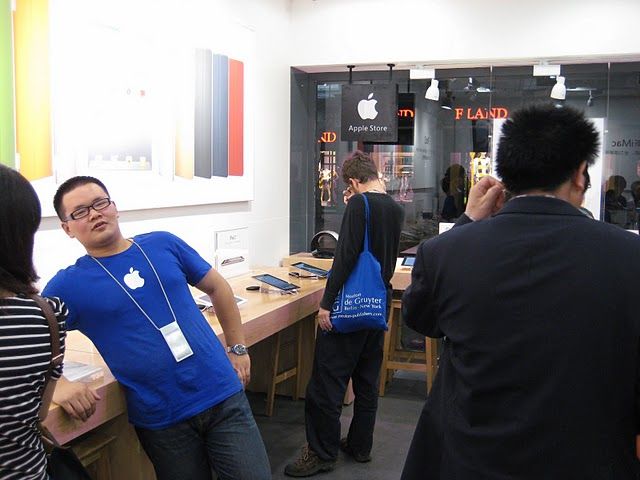China's fake Apple Stores alive and well, look to profit on iPhone 6s launch
Last updated
Thanks to lax copyright enforcement policies, growing demand for all things Apple and a lack of official retail channels, China's fake Apple Stores are experiencing a resurgence on the back of iPhone 6s preorders.
In electronics manufacturing mecca Shenzhen, a major cog in Foxconn's iPhone and iPad production machine, a multitude of counterfeit Apple stores are popping up to take advantage of Friday's iPhone 6s release, reports Reuters. According to publication estimates, more than 30 storefronts bear Apple's iconic logo, with some unauthorized outlets kitting out personnel with Apple Store-style blue t-shirts and lanyard name tags.
As they have in the past, these counterfeit stores are taking advantage of China's seemingly insatiable iPhone demand. Just hours after iPhone 6s preorders went live last week, Apple's allotment for the Chinese market sold out, pushing buyers loathe to wait an extra two to three weeks toward unauthorized stores that buy stock from official resellers and flip them for a hefty profit.
With iPhone viewed as a status symbol in China, many consumers are willing to pay more than double retail prices to get their hands on one the day it comes out. For some buyers the high costs are apparently worth the added cachet that comes with nabbing a copy on day one. Consumers in other markets are also keen to get their hands on Apple's latest smartphone, but Chinese customers are especially zealous.
The benefits are more concrete for resellers, who risk minimal retail overhead and an upfront investment by smuggling iPhones in from Hong Kong, the U.S. and other far-flung markets. If successful, however, they stand to haul in huge returns.
Apple has for years dealt with counterfeit stores, an issue that gained media attention in 2011. While Chinese officials ultimately ordered a handful of operators to shut down, the unauthorized resale industry was never completely wiped out. Now with iPhone 6s, resellers are back in business.
Part of the problem stems from an inadequate official retail presence in the region. Apple only had 22 stores serving all of China as of June. By comparison, there are 53 Apple Stores in California alone. The disparity is stands in contrast to China's market potential, which is widely viewed as vital to Apple's growth and sales sustainability. The company has plans to expand its retail footprint to 40 stores by 2016, however, the most recent being a second Hangzhou location in April.
 Mikey Campbell
Mikey Campbell














 Amber Neely
Amber Neely
 Thomas Sibilly
Thomas Sibilly
 AppleInsider Staff
AppleInsider Staff
 William Gallagher
William Gallagher
 Malcolm Owen
Malcolm Owen
 Christine McKee
Christine McKee










30 Comments
What kind of self-respecting totalitarian regime can’t crack down on this? Almost as though they want it to happen.
This is why China can never really be taken seriously. Sort of like that rich doofus uncle everyone has, and hates; the only reason anyone laughs at his jokes during the family reunion is because he's so rich. Like at work, you're as funny as your title. Have you ever wondered why every employee rolls on the floor laughing at the CEO's knock-knock joke, yet the mailroom clerk, who used to tour with Chris Rock, gets crickets from the director-level jerkoffs? You can't dear be caught not laughing by the not-funny CEO. Tim Cook would dare never bring these stores up at his next meeting with Xi.
[quote name="Tallest Skil" url="/t/188455/chinas-fake-apple-stores-alive-and-well-look-to-profit-on-iphone-6s-launch#post_2781471"]What kind of self-respecting totalitarian regime can’t crack down on this? Almost as though they want it to happen. [/quote] They're too busy trying to keep their circus tent of an economy inflated while cracking down on Taylor Swift merchandise that might bring up memories of Tiananmen Square.
Almost as though they want it to happen.
Ya think?
Is using counterfeit money in a fake store illegal?
Hmmm.